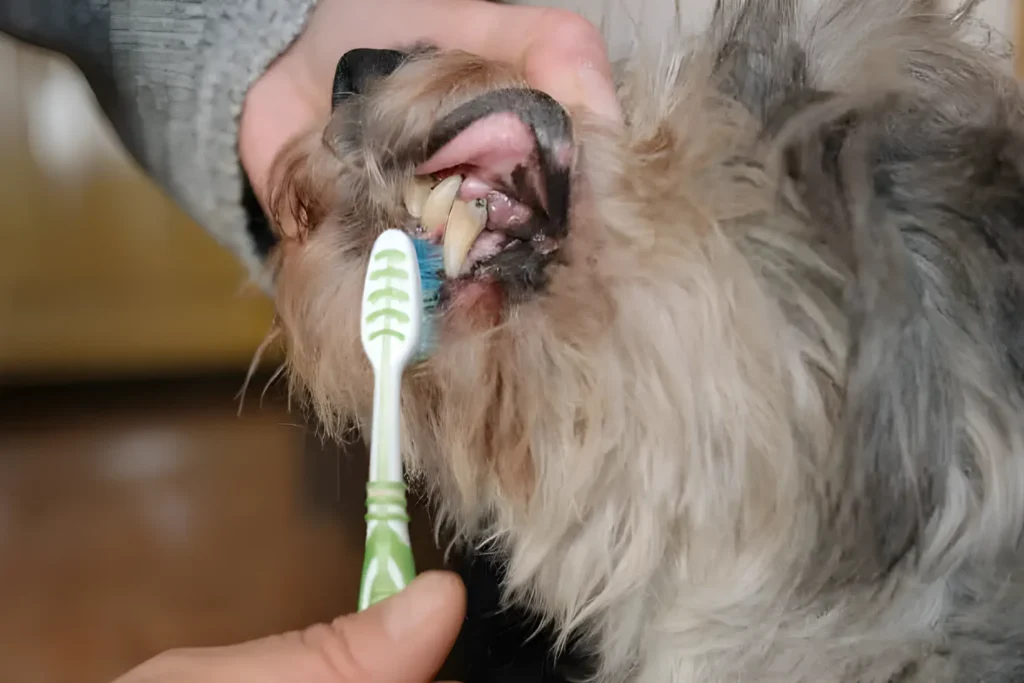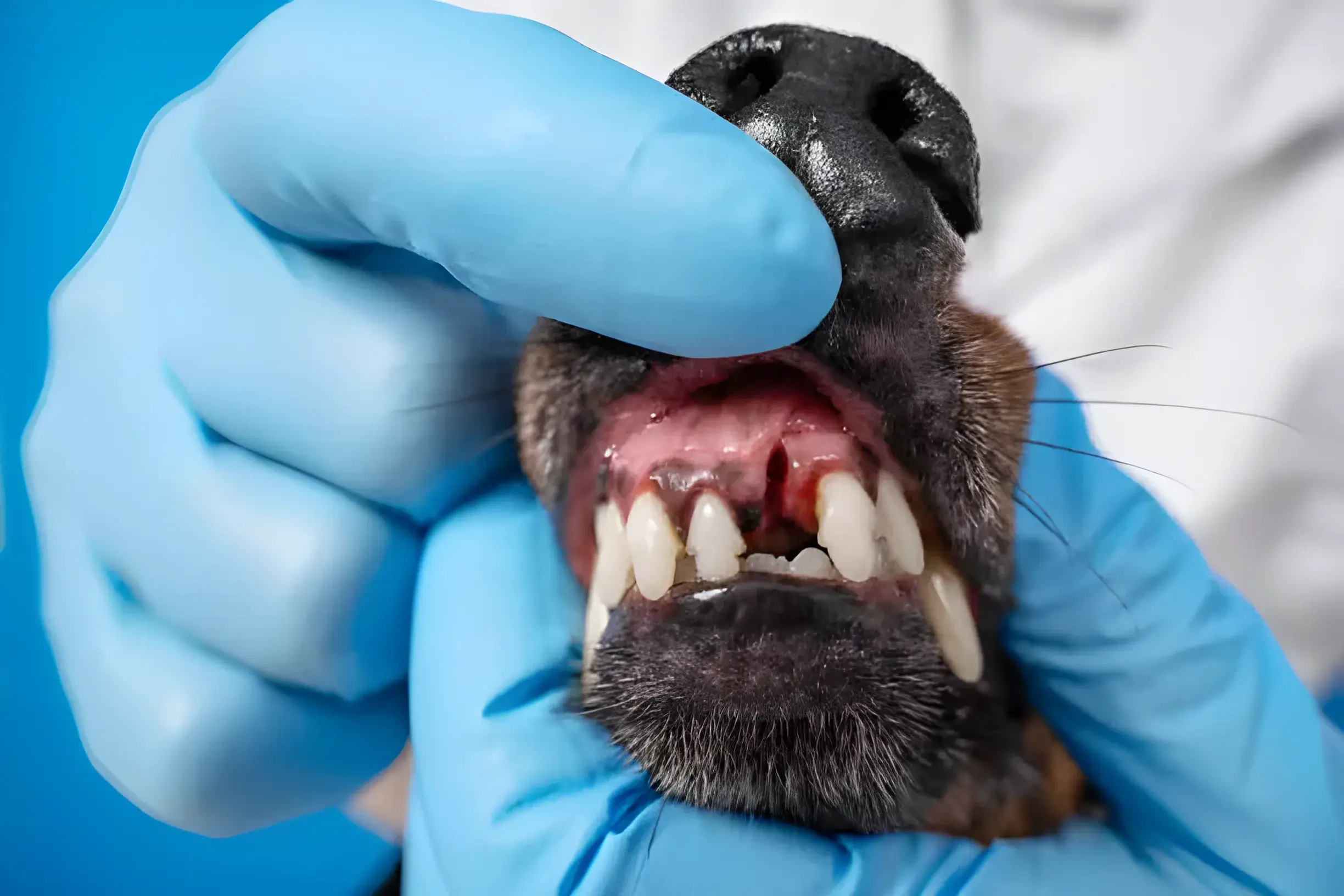Yes, dogs experience tooth loss differently depending on their life stage. Puppies naturally shed their baby teeth to make room for their strong adult set. In contrast, tooth loss for adult dogs often indicates a health concern requiring a veterinarian’s assessment.
Puppy Teething: A Normal Process
Timeline: Puppies start getting baby teeth around 3 weeks old. Between 12-16 weeks, these baby teeth fall out as adult teeth push through the gums. By about 6 months, all puppy teeth should be gone.
What to Expect: Lots of chewing! Teething puppies crave relief. Provide safe chew toys, frozen carrots, or ice cubes (supervised). Mild gum bleeding is normal.
Double Teeth: Sometimes baby teeth cling on even with an adult tooth behind it. A vet should remove these stubborn ones.
Adult Dog Teeth: Built to Last
How Many: Adult dogs have 42 permanent teeth, each with a specific function. Incisors for nibbling, canines for tearing, and molars for grinding… it’s an amazing system designed for a lifetime of meals!
When Tooth Loss is a Problem: An adult dog’s teeth aren’t invincible. Here’s when losing them is a serious concern:
- Periodontal Disease: This sneaky infection erodes the gums and bone supporting teeth. Advanced stages lead to tooth loss and severe pain.
- Trauma: An accidental bump or obsession with rock-hard chews can crack or break teeth. Open wounds in the mouth are an infection risk.
- Other Illnesses: While less frequent, some diseases weaken the immune system or affect bone density, impacting tooth health too.
Warning Signs: Don’t Ignore These
Bad Breath: It’s not just smelly, it’s a clue! Persistent bad breath often means bacterial buildup in the mouth.
Red, Swollen Gums: Healthy gums are pink. Redness and swelling indicate inflammation, a precursor to gum disease.
Difficulty Eating: Does your dog seem hesitant at mealtime, or drop food while chewing? Dental pain could be the culprit.
Pawing at the Mouth: This is their way of saying, “Something hurts in here!”
Dental Care for Life

Prevention is Key: Imagine dental checkups as armor for your dog’s smile! Vets spot early signs of trouble, way before you might at home.
Home Care: Your Mission (If Dog Accepts)
- Brushing: The gold standard! Aim for daily if possible, or a few times a week. Use dog-specific toothpaste and go slow.
- Dental Chews: Choose safe, vet-approved chews to help scrape away plaque. These aren’t a replacement for brushing, but a helpful tool.
- Avoid Hard Objects: They may seem fun, but bones, antlers, and even rocks pose a major risk of fractured teeth.
When to See the Vet Right Away: Don’t wait if you notice:
- Loose Teeth: Even a wiggly tooth needs urgent assessment
- Bleeding Gums: This signals active infection
- Refusal to Eat: Severe mouth pain makes eating impossible
How to Check Your Dog’s Teeth at Home
Get Comfortable: Choose a quiet time when your dog’s relaxed.
Gently Lift the Lips: Start by just lifting the lips, front and back, to see the teeth and gums.
Look for Signs of Trouble: Healthy gums are pink, not red or swollen. Teeth should be white with no tartar buildup, chips, or looseness. Bad breath is a sign of concern.
Reward: Give your dog praise and a treat after.
Are Some Breeds More Prone to Dental Problems?
Yes! Small breeds are often at greater risk due to teeth crowding in their smaller mouths.
Brachycephalic breeds (short-faced, like pugs and bulldogs) have misaligned teeth, making them prone to tartar buildup.
If you own one of these breeds, be extra vigilant with dental care and checkups.
Conclusion
Puppyhood naturally involves teething, but tooth loss in older dogs shouldn’t be ignored. Prioritizing dental care at every age supports your dog’s lasting comfort and well-being.
The photo featured below the post headline is Credit: Ирина Мещерякова/istockphoto
I hope you find this post helpful and informative. If Yes’ feel free to share it with your friends!
Frequently Asked Question
My puppy is swallowing their teeth. Is this okay?
Yes, it’s harmless.
How often should I brush my dog’s teeth?
Ideally, daily. If not possible, a few times a week is helpful.
My dog hates having their teeth brushed. What can I do?
Start slowly, use positive reinforcement, and consider dental chews or vet cleanings as alternatives.
Why is my old dog’s teeth falling out?
Most likely, it’s periodontal disease. See the vet ASAP.
What’s the best way to prevent dog dental problems?
Regular vet exams and at-home dental care are essential.
How do I maintain my dog’s dental health?
Brushing (if tolerated), dental chews, and avoiding hard objects are key. See your vet for professional cleanings as needed.
Does my dog need professional teeth cleaning?
Most dogs benefit from periodic professional cleanings to remove tartar buildup that home care can’t eliminate. Your vet will advise the best schedule.
Can dog tooth decay or infection spread to other parts of the body?
Yes, severe dental infections can have serious health consequences, potentially affecting the heart, kidneys, and other organs.
My dog is afraid of tooth brushing. What can I do?
Start slowly, with lots of praise. Gradual desensitization is key. Ask your vet for tips or other dental care options.
Are there special dental treats for dogs?
Yes, many dental treats and chews help reduce tartar. Look for ones approved by the Veterinary Oral Health Council (VOHC).
Is there a specific toothpaste for dogs?
Yes, never use human toothpaste as it contains ingredients harmful to dogs. Special dog toothpaste comes in enticing flavors.
How often should I check my dog’s teeth?
Ideally, do a quick check weekly as part of your routine. This helps you notice any changes early.
My dog’s breath is terrible. Is this just normal dog breath?
No! Persistent bad breath is often the first sign of dental disease. Get your dog checked by a vet.

